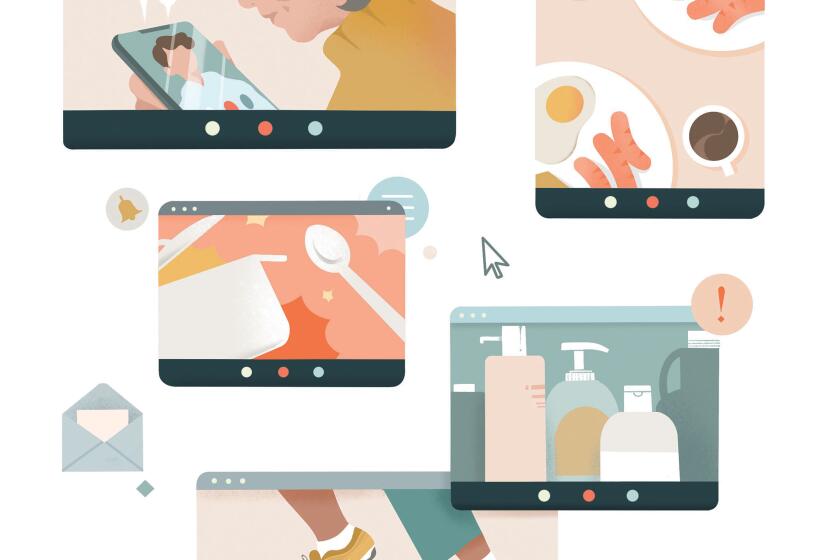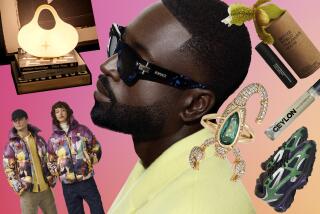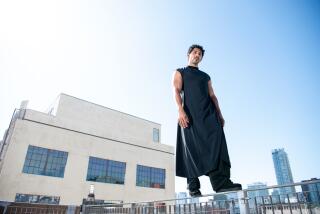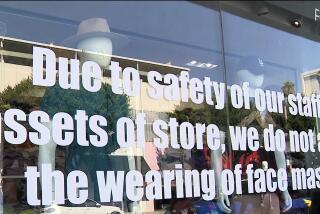Op-Ed: I see face masks as a socially acceptable fashion opportunity. So should you
- Share via
I’m assembling a wardrobe of face masks. I’ve even installed a brass accordion rack in the laundry room to hang them with my hats. As a recovering fashion writer, I’ve never been one to miss an opportunity to stock up on the fashion accessory of the moment.
Two good friends made me some standard solid-color models. My other masks are in a Western-cowboy vein, and another features a leopard print. And I have an N95 that I use when I work at the food bank since I’m “of a certain age.”
But I’m just getting started. A few Hermes scarves ready for retooling are on their way from Ukraine via Etsy. I’m planning on temporarily slipping them over surgical styles for big nights out that could warrant a dry-cleaning splurge. We’ll be able to step out someday, right?
My collection may sound over the top, especially to those who view mask-wearing in the age of the coronavirus as a serious no-frills-allowed business. An Australian critic described stylish masks as “trying to make something horrific seem appealing.” And when George Clooney’s sister-in-law, Tala Alamuddin, began selling “luxury” face masks, another critic said it was “wrong for her to try and make a face mask some trendy new fashion accessory.”
I beg to differ. By definition, style is a marriage of form and function. Since the scientists say we’ll be Christmas shopping in masks, we’re clearly in this for the long haul. What’s the harm in scouting for a tartan fabric to match my holiday skirts?
In our “Dispatches From the Pandemic” series, we bring you personal stories from people whose lives have been altered by COVID-19.
Fashion has upgraded our illness-avoidance skills through the centuries. Hundreds of years ago, small purses known as “plague bags” were worn during the Qin dynasty and filled with herbs to ward off plague-carrying creatures; in Europe they held sweet-smelling sachets thought to keep away miasma, a noxious form of bad air. Today, companies make sun-protective clothing for people with melanoma or camo-printed hats for beekeepers intent on avoiding bee stings. They come in assorted prints and colors, but that doesn’t trivialize their purpose.
My mask wardrobe leans toward one-of-a-kind models, maybe because I’ve always had a weakness for designer originals. I’m steering away from the designer knock-offs — yes, they are a thing — with their obvious trademark-infringement issues. My lawyer husband would prefer I not break the trademark laws he labors to uphold.
For karaoke nights at the local Elks Club in Orange County, I plan to dress up disposable masks by tying scarves around them. I may even break out tiny press-on jewels and funky iron-on appliques to add whimsy to something that can look so off-putting and somber in its unadorned form.
Masks that protect us don’t have to take away our individuality, and they should be considered a socially acceptable way to make a fashion statement. Being fashionable doesn’t make me insensitive to the grave consequences of coronavirus. Even with my face largely covered, my fabulous mask says, “This is how I want you to see me.”
Cindy LaFavre Yorks is a former Los Angeles Times assistant features editor. She blogs at cindyyorks.com.
More to Read
A cure for the common opinion
Get thought-provoking perspectives with our weekly newsletter.
You may occasionally receive promotional content from the Los Angeles Times.









